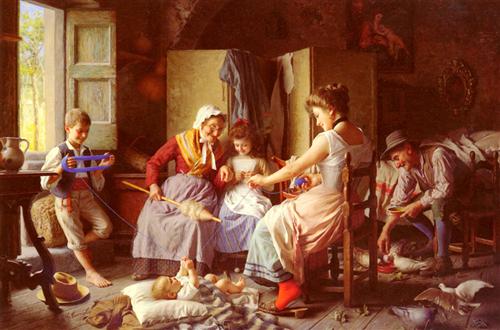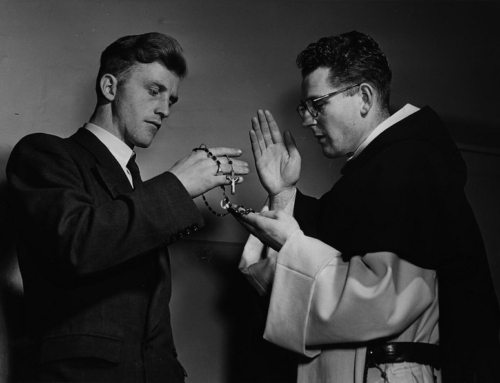In the Middle Ages, the disputed question was one of the major forms of academic investigation. A master of theology would pose a question on which great authorities seemed to disagree, then entertain objections from fellow masters and students. After others attempted to reconcile the various authorities, the master would give a determination that resolved the question.
In our form of the disputed question, two student brothers approach a difficult issue from different angles in order to reveal its complexity. These essays are meant to be complementary, not contradictory. Each of the brothers is then given the opportunity to reflect upon the contribution of the other. The section closes with a final summary provided by the editors, who do not pretend to play the role of master.
THE QUESTION
In a world becoming ever more saturated by sources of information and stimulation, it may be only natural to take a step back and ask about the proper place of television in the family. While we may think that such a question pertains solely to staunchly conservative and patently Catholic homes, a much broader swath of contemporary society is ruminating over this very issue. Such a question concerns human flourishing, which is a universal concern, not the purview of a select few.
The Church teaches that the human experience requires careful consideration of the interplay between nature, technology, and morality (Compendium of the Social Doctrine of the Church 16). Such meditations are not only personal but inherently social concerns. Consequently, it is important for all of us to consider the place of television in the family, the integral unit of society. Is there a place for watching television in the modern Catholic household?
NO TV: IS IT POSSIBLE TO LIVE THIS WAY?
Athanasius Murphy, O.P.
In his work On Christian Doctrine, St. Augustine distinguishes between the goods of the world that are used and the goodness of God that alone is to be enjoyed. The modern Catholic family has before it many created goods which it can choose to use or do without. With respect to television, I argue that the Catholic family can and ought to do without this good. My reasons deal with the type of good that TV offers and the degree to which that good relates to the family’s perfection in the Christian life.
To be clear, television is not evil. TV offers a definite and limited good in the realm of leisure and social recreation with family members and other folks. The issue, however, is not whether TV offers any benefit, but whether we can easily discern its benefits in the midst of its numerous detriments. While TV offers several goods, its downsides—the quantity of time we invest, the quality of entertainment, and its influence on daily living—are far more harmful.
On its own, the sheer quantity of time that families spend watching TV is a compelling point. It is hard to speak of a “normal” quantity when the national mean is five hours a day per family. The modern family has a certain amount of leisure time, and most of that is spent in front of the television. Furthermore, in the past twenty to thirty years, as Americans have gained leisure time, they have dedicated nearly all of this “new” time to sitting in front of the TV.1
Besides the quantity of time spent watching TV, the quality of entertainment that TV brings into the home is negligible. Watching a show, like FOX’s or NBC’s 8:00 p.m. lineup, fails to stimulate the mind and offers a quality of entertainment that is usually less than satisfying. Besides TV shows, there are also commercials, which make up about 20–25% of any hour-long series. Some commercials are quite entertaining, but most are annoying and repetitive. Consider the frequency with which your family has watched the same laundry detergent commercial without ever being inclined to change brands. Now think of how many prescription drug commercials displaying old fogeys climbing and kayaking you will watch this week for diseases you will never have in your life. If we are willing to sit through this much unhealthy repetition, what else do we voluntarily choose to watch?
Watching TV can also influence how we view reality. I am not claiming that we become a living replica of the characters from our favorite TV shows. But TV life often influences the way we speak, shapes the way we joke, directs the way we think, and, ultimately, changes the way we live. Ask any family member about his favorite TV show and see whether he has not picked up on the jargon of some of the characters. Now, it is not bad to draw your words or behavior from role models, but consider the type of models that television provides. Some TV shows are able to offer a resolution or lesson worth taking to heart, but many are not. And even when the main point of the show is wholesome, this larger lesson is usually couched in clusters of off-color and vulgar scenes, phrases, and innuendos that are just as, if not more, memorable than the main plot. Why make this the family’s nightly viewing?
Habitually watching TV may also encourage the family to see life in an oversimplified way. Most TV shows have plotlines and characters that lack any further depth than can be presented and resolved in a sixty-minute period. Such streamlined stories, especially if watched nightly, goad us to expect a similar, simplified mode of living for ourselves. No one could prove that watching the heroes of CSI wrap up another homicide in one hour leads me to think tomorrow’s work day will take care of itself, but it certainly does not leave me without any effect.
Consider the feeling you get after watching some hour-long show that gives you the perceived sense of accomplishing what those characters did, without having done anything yourself but sit on a couch. Why, after watching a detective solve some big case, do I feel as if I have made some big discovery when my son’s decline in trigonometry is still just as mysterious as it was before? Why, after watching a war show, do I have the sense of finishing some mission when tomorrow’s trip with the wife and kids is just as unplanned as an hour ago? Watching TV may lead us to shirk off higher goods and opportunities in life that fail to fit inside this mold of simplistic TV living.
Television is certainly one form of leisure available to the modern, Catholic family. But it is one option among many others and is chosen with far too high a frequency. Consider the amount of free time a family has together each weeknight. Work, school, homework, and after-school sports leave the typical family with three to four hours together before it is time to sleep. I do not think it is an exaggeration to say that those three to four hours are spent watching TV, or at least those hours include having the TV on. Beyond the fact that nearly all of a family’s free time on a given weeknight is spent watching TV, only in certain cases is everyone in the same room watching the same show. Oftentimes this is done to the neglect of even having dinner together.
In contrast, consider the number of other leisurely activities available for the family today: A family could prepare and share a prolonged dinner together, with each person taking charge of some part of the meal. A family could pray the rosary or the liturgy of the hours together before or after dinner. A family could sing or do something musical for one hour a week. Or, on the more creative side, a family could read aloud some book or recite some play together, which may not be extremely professional or well done, but would certainly be entertaining, if only for comical reasons. (Did not Chesterton observe that whatever was worth doing at all was worth doing badly?) If these choices sound too laborious or complex, then there is always simple conversation about current affairs inside and outside the home.
For these reasons, watching TV, especially to the degree it is done today by families, can and should be done without.
Endnotes
1 Bruno S. Frey, Christine Benesch, and Alois Stutzer, “Does Watching TV Make Us Happy?,” Journal of Economic Psychology 28 (2007): 283–313, doi:10.1016/j.joep.2007.02.001. This study reports that while the average American has gained six hours of leisure time a week over the past thirty to forty years, the average amount of TV watching has also increased the same amount, meaning that all additional leisure time has been given to TV.
KNOCKING AT THE DOOR:
VIEWING TELEVISION AS A GUEST
Joseph Hagan, O.P.
The moral concerns of television are legion. Many TV shows glamorize vice, moving their viewers to thirst for that which cannot satisfy, and commercials often indoctrinate their viewers in consumerism, teaching them to view the world in terms of instant gratification and pragmatic utility.
These concerns should give pause to any family that takes its Catholic faith seriously, let alone anyone who wants to live the good, virtuous life. However, such concerns—strong though they may be—do not eradicate all value from television. Rather, they call for prudence. There is still the possibility that television has something to offer the modern Catholic family. But what is this something?
Let us begin with a thought experiment. Imagine that every show and commercial on television is a person seeking to come into your house. Each of them in turn rings your doorbell, stands on your porch, and asks to come in. Some are funny, some are dramatic, and some are boisterous. Some are well-behaved; others, not so much.
There are important questions. Who gets invited into your house to be your guest? Who stays at the doorstep? Who is allowed to decide which ones are invited inside? Are children allowed to invite guests in? Are certain guests only to be received by certain family members? How long are different guests allowed to stay? Can they invite in commercials or the next show? Finally, there is the question about the goodness of television: which guests help the family to flourish?
Following this thought experiment, we can identify the shows that we would leave at the doorstep because they add nothing of value to the family. For instance, if you opened your front door and found a man trying to sell you the latest pill for aging baby-boomers, you would most likely shut and lock the door. “No, thank you, sir!” Or think of reality TV shows. Would you really want to open your home to the Kardashian sisters or to the mothers of Toddlers in Tiaras?
We can also identify the shows that we would gladly welcome. The doorbell rings, and there is Mr. Fred Rogers, greeting you in song: “It’s a beautiful day in the neighborhood.” Perhaps I am biased, but I would gladly receive him as my neighbor. Maybe it is a Saturday afternoon, and a sports reporter is at your door who wants to give you the play-by-play of the Fighting Irish of Notre Dame taking on—and trouncing—the USC Trojans. For many, such a reporter would be a welcomed guest. Or, perhaps, it is a weeknight, and a great storyteller comes to your door. After a long day’s work, who wouldn’t enjoy a little leisure by taking in an entertaining drama?
From this, I propose three ways that television can bring something good to the family. This is not an exhaustive list, but a starting point.
First, television can provide programming that reinforces family values. Some shows do this directly, such as Mr. Roger’s Neighborhood, but many do this indirectly by providing parents with teaching moments. If a show poses a moral question, parents have the chance to shape their children’s response, even if the show advocates an immoral choice. The key is active parenting. Television may pose questions, but parents have the final say.
Second, television can grant a family visual access to cultural events, such as sports, political speeches, or even papal Masses. Watching baseball together, a father can teach his son when and why you call for a bunt. Perhaps that sounds trivial, but through such little things, great bonds are formed. It is also valuable for families to see their leaders, whether it is the president delivering the State of the Union address or the Holy Father celebrating Easter Sunday Mass. Television provides access to these important moments.
Third, television can provide quality entertainment, the kind of entertainment that brings relaxation and delight. This is probably the most common good of television and the good that needs the least explanation. A little entertainment, a pinch of laughter, or a dash of escape from the mundane can keep the spice in life.
We must, however, make several important qualifications. First, there are all the issues of prudence already discussed. With all its vices, television requires a stout moral vigilance. Some shows cross the line of moral repugnance and do not possess enough that is redeemable to offset the bad; these shows should be avoided. Second, these goods require one to be purposeful. If we watch television to refresh ourselves, we need to ask if this is truly refreshing. If we end up exhausted afterward, then we know something went wrong. Third, these goods are best enjoyed with other people. If we get in the habit of using television to avoid other people instead of forming friendships, then there is not much goodness left in television.
Additionally, there are better ways of achieving these same goals. Do you want to reinforce family values? Plan a family outing or make an excuse to spend quality time with your family. Do you want to connect with your culture? Go to neighborhood events, visit your state legislature, or attend Mass at your local cathedral. Do you want to relax and be merry? Play games together, take a walk, or just talk to each other over hot tea. If you think outside the television box, there are countless possibilities.
Families flourish through love, and love is between people, not between a person and his television. Here is a simple test: Does television make us more or less loving? If it brings the family together and helps them engage with each other, great. But if it becomes a vacuum, sucking the life out of a family, or a wedge, dividing people, then there is a serious problem.
In the end, television provides a good that is more quick than satisfying. Television may aid a family, but it does so imperfectly. Those families seeking virtue would be wise to minimize their time watching television and instead develop other, more satisfying means of leisure and recreation. Let television be a guest in the Catholic home—a passing guest—who does not outstay his welcome, but tips his cap and moves along.
A REPLY TO KNOCKING AT THE DOOR
I am very thankful for Br. Joseph’s essay on the virtues of TV watching. He has a way of writing that grabs your attention, and his nuanced approach to this question allows us to think outside the box.
The first part of his essay underlines the value and priority of prudence for any family watching TV. Advocating such a practice broadly reveals his desire to set a firm foundation on which particular instances of good TV watching can be supported. Br. Joseph is also careful not to dictate a family’s every move and decision.
His provoking thought experiment at the beginning catches your attention and carries through the essay to remind you of TV’s limited and passing nature. The portrayal of TV shows and commercials as guests in the family home is an arresting image that teaches any TV viewer to distinguish between the good stories and false friends knocking at the family’s front door.
The second part of his essay is by far my favorite. His three ways that television can bring something good to the family are diverse enough that a family can choose to use all three or just one. That TV can only be an active teaching instrument in the home if there is parental guidance is an important principle. Br. Joseph accurately labels television as a communal good that fosters existing relationships within the family. Connecting to the world-at-large is an excellent way for any family to know its civil or spiritual leaders. Many historic moments are captured on the visual frame, and to deny a family these would be an unreasonable privation.
Relaxation and delight are good things to have, and TV can offer this. I think that Br. Joseph would agree that the quantity and quality of this delight are the hinge of both our arguments. Br. Joseph cuts and polishes the goodness of TV to its proper and limited size so that you can reject the vices without losing the benefits.
Yet Br. Joseph advocates vigilance along with prudence—a worthy pair of sails for any modern Catholic family voyaging into visual entertainment. These two, combined with the rudder of purposefulness, ought to make anyone’s TV travels less of an exhaustion and more of a delight.
One area of his piece where I sought a fuller explanation was in his reference to particular TV shows. The virtues of prudence, vigilance, and purposefulness are indeed universally helpful for any Catholic family. But the question still stands as to which particular shows offer something fruitful for the family. This is where the difficulty lies, but this is also where the named virtues are meant to thrive.
— Athanasius Murphy, O.P.
A REPLY TO NO TV
I enjoyed Br. Athanasius’ well-thought-out and well-researched essay. I suspect that we are very much in agreement about television and today’s family. Television poses serious threats to the family, both by its content (working against virtue) and by its invasive nature (consuming one’s free time). With respect to family growth, the limp glow of the television screen pales in comparison to the living light of real human interaction. In other words, families grow in love more by their time together away from the television screen than before it.
In an ideal world, families would find little need for television, being engaged instead with more fulfilling activities. They might have a television, but would use it infrequently. To some extent, there are some families that already embrace such an ideal, but many families do not and, perhaps, cannot. Some families seem glued to their television. What happens if we live in such a family? Surely, we need not reject both television and our family. So what are we to do?
I propose two approaches. First, find ways of cutting out the commercials. These are both wearisome (dragging out the show you are watching) and worrisome (accosting you with unwanted solicitations). An easy way to do this is through a Netflix account, by watching the DVDs of a television series, or by recording shows through providers like TiVo and fast-forwarding through the commercials. Each of these allows the family to watch a show together and even pause the show for a teaching moment.
Second, find quality television programs. Just as a bookshelf can hold both trashy novels and literary masterpieces, so too television can carry both pitiful and excellent shows. I would recommend finding a good miniseries, such as Brideshead Revisited, Pride & Prejudice, Ken Burns’ Civil War, Blue Planet, or Planet Earth. See what your library has. This may take a little research to find good programs that would interest your family. However, this is a good way of meeting your family halfway. If your family is glued to the television, at least watch quality programs with them.
I propose these two approaches as a way of finding a compromise. There remains the issue that we tend to habitually spend all our free time watching television. Against this tendency, we must grow in stronger habits of enjoying life outside of the box.
— Joseph Hagan, O.P.
RECAPITULATION
So, what is there to say about the value of watching television? There is certainly a plethora of reasons to tune-out, or even turn-off and unplug the television set. Nevertheless, as the above discussion indicates, TV viewing is not simply an activity devoid of worthwhile benefit. Like much of life, we find in television a mixture of positive and negative elements. While a healthy dose of television requires the practice of prudence and its attendant virtues, watching TV can and does still constitute a good source of recreation, education, and communication.
In the thirteenth century, Saint Dominic tirelessly worked to uphold the goodness of God’s creation against those who saw the material world as purely evil. Likewise, we should not be too quick to denigrate the technological advances of human beings, simply because they can be—and often are—used to negative ends. As Brs. Athanasius and Joseph agree, television can be introduced in the Catholic home in a virtuous and productive manner. Thus, the question leads us to begin discerning the proper bounds in which we should welcome TV into our homes. And so, the conversation continues.
— The Editors
To download a printable PDF of this Article from
Dominicana Journal, Summer 2015, Vol LVIII, No. 1, CLICK HERE.





